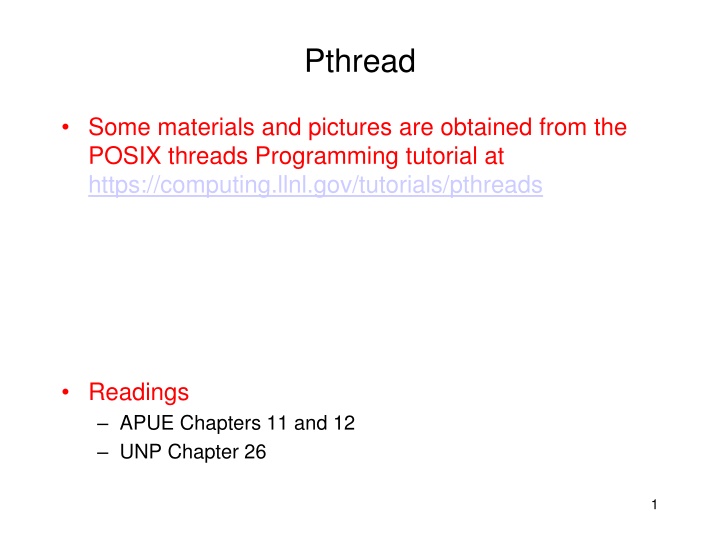
Threads in POSIX Programming
Delve into the concept of threads in POSIX programming through tutorials, examples, and visual aids. Learn how threads operate independently within processes, the advantages they offer, and their role in creating multithreaded programs.
Download Presentation

Please find below an Image/Link to download the presentation.
The content on the website is provided AS IS for your information and personal use only. It may not be sold, licensed, or shared on other websites without obtaining consent from the author. If you encounter any issues during the download, it is possible that the publisher has removed the file from their server.
You are allowed to download the files provided on this website for personal or commercial use, subject to the condition that they are used lawfully. All files are the property of their respective owners.
The content on the website is provided AS IS for your information and personal use only. It may not be sold, licensed, or shared on other websites without obtaining consent from the author.
E N D
Presentation Transcript
Pthread Some materials and pictures are obtained from the POSIX threads Programming tutorial at https://computing.llnl.gov/tutorials/pthreads Readings APUE Chapters 11 and 12 UNP Chapter 26 1
What is a Thread? OS view: A thread is an independent stream of instructions that can be scheduled to run by the OS. Software developer view: a thread can be considered as a procedure that runs independently from the main program. Sequential program: a single stream of instructions in a program. Multi-threaded program: a program with multiple streams Multiple threads are needed to use multiple cores/CPUs 2
Example Multithreaded Programs? Computer games Each thread controls the movement of an object. Scientific simulations Hurricane movement simulation: each thread simulates the hurricane in a small domain. Molecular dynamic: each thread simulates a subset of particulars. Web server Each thread handles a connection. 3
Process and Thread Process context Process ID, process group ID, user ID, and group ID Environment Working directory Program instructions Registers (including PC) Stack Heap File descriptors Signal actions Shared libraries Inter-process communication tools Which contexts are for running instructions independently? which are for protection from other processes? 4
Process and Thread What are absolutely needed to support a stream of instructions? Process ID, process group ID, user ID, and group ID Environment Working directory. Program instructions Registers (including PC) Stack Heap File descriptors Signal actions Shared libraries Inter-process communication tools 5
Threads Exist within processes Die if the process dies Use process resources Duplicate only the essential resources for OS to schedule them independently Each thread maintains Stack Registers Scheduling properties (e.g. priority) Signal mask Thread specific data 7
Advantages of Threads Light-weight Lower overhead for thread creation Lower context switching overhead Fewer OS resources 8
fork() pthread_create() Platform real user sys real user sys AMD 2.4 GHz Opteron (8cpus/node) 17.6 2.2 15.7 1.4 0.3 1.3 IBM 1.9 GHz POWER5 p5-575 (8cpus/node) IBM 1.5 GHz POWER4 (8cpus/node) 64.2 30.7 27.6 1.7 0.6 1.1 104.5 48.6 47.2 2.1 1.0 1.5 54.9 1.5 20.8 1.6 0.7 0.9 INTEL 2.4 GHz Xeon (2 cpus/node) 54.5 1.1 22.2 2.0 1.2 0.6 INTEL 1.4 GHz Itanium2 (4 cpus/node) 9
Advantages of Threads Shared state Don t need IPC-like mechanism to communicate between threads of same process 10
Disadvantages of Threads Shared state! Global variables are shared between threads. Accidental changes can be fatal. Many library functions are not thread-safe Library functions that return pointers to static internal memory. E.g. gethostbyname() Lack of robustness Crash in one thread will crash the entire process. 11
Pthreads Hardware vendors used to implement proprietary versions of threads Thread programs are not portable Pthreads = POSIX threads, specified in IEEE POSIX 1003.1c (1995) We will only discuss the most commonly used APIs of Pthread 12
The Pthreads API Three types of routines: Thread management: create, terminate, join, and detach Mutexes: mutual exclusion, creating, destroying, locking, and unlocking mutexes Condition variables: event driven synchronization. Mutexes and condition variables are concerned about synchronization. Why not anything related to inter-thread communication? The concept of opaque objects pervades the design of the API. 13
The Pthreads API Naming Convention Routine Prefix pthread_ pthread_attr_ pthread_mutex_ pthread_mutexattr pthread_cond_ pthread_condattr pthread_key_ Function General pthread Thread attributes mutex Mutex attributes Condition variables Conditional variable attributes Thread specific data keys 14
Thread Management Routines Creation: pthread_create Termination: Return from starting routine pthread_exit Can we still use exit? Wait (parent/child synchronization): pthread_join Pthread header file <pthread.h> Compiling pthread programs: gcc pthread aaa.c gcc lpthread aaa.c 15
Creation Thread equivalent of fork() int pthread_create( pthread_t * thread, pthread_attr_t * attr, void * (*start_routine)(void *), void * arg ); Returns 0 if OK, and non-zero (> 0) if error. Parameters for the routines are passed through void * arg. Is there anything that you cannot pass to a thread? 16
Termination Thread termination Return from initial function. void pthread_exit(void * status) Process termination exit() called by any thread main() returns 17
Waiting for Child Thread int pthread_join( pthread_t tid, void **status) Equivalent of waitpid()for processes 18
Detaching a Thread The detached thread can act as daemon thread The parent thread doesn t need to wait int pthread_detach(pthread_t tid) Detaching self : pthread_detach(pthread_self()) 19
Some Multi-thread Program Examples A multi-thread program example: example1.c Making multiple producers: example2.c What is going on in this program? 20
Multi-threaded parallel program design pattern 1 A multi-threaded parallel program achieves speed-up by sharing the computation across multiple threads. Different threads work on different sub-problems that are independent. Need to be able to compute the sub-problem for each threads Design pattern 1: derive the sub problem for a thread (id = i) from the original problem, the total number of threads working on the problem, and thread id. Each thread knows the problem size and has access to variable nprocs (total number of threads working on the problem), and myid (its thread id). 21
Example: Matrix multiply and threaded matrix multiply Matrix multiply: C = A B N = k = , [ ] , [ ] [ , ] C i j A i k B k j 1 0], C[0, C[0, 1], ......, C[0, N - 1] 0], A[0, A[0, 1], ......, A[0, N - 1] 0], B[0, B[0, 1], ......, B[0, N - 1] 0], C[1, C[1, 1], ......, C[1, N - 1] 0], A[1, A[1, 1], ......, A[1, N - 1] 0], B[1, B[1, 1], ......, B[1, N - 1] = .......... .......... .......... .......... ......... .......... .......... .......... .......... ......... .......... .......... .......... .......... ......... C[N - 1, 0], C[N - 1, 1], ......, C[N - 1, N - 1] A[N - 1, 0], A[N - 1, 1], ......, A[N - 1, N - 1] B[N - 1, 0], B[N - 1, 1], ......, B[N - 1, N - 1] 22
Matrix multiply and threaded matrix multiply Sequential code: For (i=0; i<N; i++) for (j=0; j<N; j++) for (k=0; k<N; k++) C[I, j] = C[I, j] + A[I, k] * A[k, j] See mm.c No dependence in i and j loops (the iteration space can be executed in any order). Threaded code with nprocs and myid Let the number of threads working on this be nprocs, each process should compute N*N / nprocs entries. We can distribute either i loop, j loop or both. If we distribute j loop, what is the range of indices should thread myid compute? 23
Matrix multiply and threaded matrix multiply Code for thread myid (assume N is divisible by nprocs) For (i=0; i<N; i++) for (j=myid * N / nprocs; j<myid * N / nprocs + N / nprocs; j++) for (k=0; k<N; k++) C[I, j] = C[I, j] + A[I, k] * A[k, j] Threaded code program mm_pthread.c. Can we distribute i loop or both i and j loop? 24
PI Calculation 1 n 0 . 4 i n = i = lim( ) PI 2 5 . 0 n 1 n + 0 . 1 Sequential code: pi.c h = 1.0 / (double) n; sum = 0.0; for (i = 1; i <= n; i ++) { x = h * ((double)i - 0.5); sum += 4.0 / (1.0 + x*x); } Threaded code for thread myid and nprocs (number of threads working on the problem)? 25
PI Calculation 1 n 0 . 4 i n = i = lim( ) PI 2 5 . 0 n 1 n + 0 . 1 Sequential code: pi.c h = 1.0 / (double) n; sum = 0.0; for (i = 1; i <= n; i ++) { x = h * ((double)i - 0.5); sum += 4.0 / (1.0 + x*x); } Can the loop be executed in parallel? 26
PI Calculation 1 n 0 . 4 i n = i = lim( ) PI 2 5 . 0 n 1 n + 0 . 1 Threaded code for thread myid: h = 1.0 / (double) n; sum[myid] = 0.0; for (i = myid * n / nprocs + 1; i <myid * n/procs + 1 + n/nprocs; i ++) { x = h * ((double)i - 0.5); sum[myid] += 4.0 / (1.0 + x*x); } Multi-threaded version: pi_pthread.c 27
PI Calculation 1 n 0 . 4 i n = i = lim( ) PI 2 5 . 0 n 1 n + 0 . 1 What about the following threaded code for thread myid: h = 1.0 / (double) n; sum[myid] = 0.0; for (i = myid + 1; i < n; i + = nprocs) { x = h * ((double)i - 0.5); sum[myid] += 4.0 / (1.0 + x*x); } Block distribution and cyclic distribution 28

